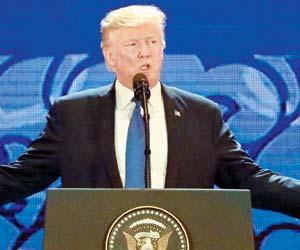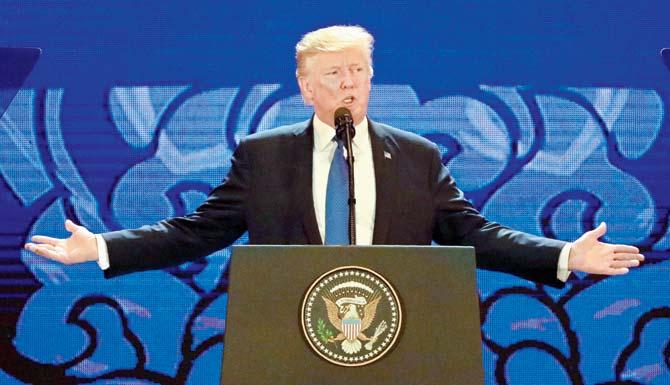Pakistan Tehreek-e-Insaf (PTI) chief Imran Khan said Pakistan should "delink" itself from the US after its humiliation "by an ungrateful Donald Trump"

 Donald Trump
Donald Trump
ADVERTISEMENT
Amid opposition calls for retaliation, the Pakistan government on Friday accused the US of betrayal and decried "arbitrary deadlines" and "unilateral pronouncements" after the Donald Trump administration suspended an estimated $1 billion in military assistance. In one of the harshest actions in years between the troubled allies, Washington moved to block the military aid at the end of a contentious week that began with Trump bashing Islamabad for years of "lies & deceit" as well as for harbouring terrorists.
The US State Department officials said they were holding back the aid as an incentive for Islamabad to take "decisive action" to rid its lands of terrorist safe havens. It also placed Pakistan on a watch list of countries failing to protect religious freedom. "Working towards enduring peace requires mutual respect and trust along with patience and persistence," Pakistan's Foreign Ministry said in a statement. "Arbitrary deadlines, unilateral pronouncements and shifting goal posts were counterproductive in addressing common threats."
The Ministry defended Islamabad's stance on terrorism, saying that "it has fought the war against terrorism largely from its own resources which has cost over $120 billion in 15 years. "We are determined to continue to do all it takes to secure the lives of our citizens and broader stability in the region."
In an interview on Thursday with the Geo News channel, Foreign Minister Khawaja Asif said that the US was now neither a friend nor ally, but "a friend who always betrays". He also accused Trump of "speaking the language of India". Pakistan's opposition, meanwhile, called for concrete actions to retaliate.
Pakistan Tehreek-e-Insaf (PTI) chief Imran Khan said Pakistan should "delink" itself from the US after its humiliation "by an ungrateful Donald Trump". Addressing a fiery press conference outside his residence in Islamabad, Khan called the Pakistan government to expel some US diplomatic personnel and cut off supply routes for the US-led coalition forces from the port city of Karachi to landlocked Afghanistan, as well as close its airspace to US forces.
The political elite of Pakistan were responsible for the threats and strained relations between the two countries, Khan said, referring to the Pakistan Muslim League-Nawaz (PML-N) government. The US has given Pakistan more than $20 billion in reimbursements and military assistance since 2002, but that aid has diminished over the years, to the point that Pakistani officials have insisted its suspension will have minimal impact, the New York Times reported.
"The suspension is arguably more significant as a signal of Washington's discontent than as an act of financial deprivation," said Joshua T. White, an Asia analyst who was director of South Asian affairs at the National Security Council during the Obama years. "The Trump administration has likely sketched out an escalation strategy, and would be wise to pause after Thursday's announcement to give Pakistan the opportunity to quietly address US concerns."
The content/reporting displayed on our website www.mid-day.com is provided "AS-IS," "AS AVAILABLE, by us from a third party, agencies, sources, without any verification from our side. It may contain error, bugs and other limitations. The readers' can rely on the content at their own will. Mid-day accepts no responsibility or liability for its dependability, trustworthiness, reliability, data, text, images, video, messages, or any other material whatsoever or for any claims/loss/action that the reader may suffer as a result of relying on the content on our site. Mid-day management/mid-day.com reserves the sole right to alter, delete or remove (without notice) the content in its absolute discretion for any reason whatsoever.
Download the new mid-day Android and iOS apps to get updates on all the latest and trending stories on the go
Trending videos
 Subscribe today by clicking the link and stay updated with the latest news!" Click here!
Subscribe today by clicking the link and stay updated with the latest news!" Click here!






